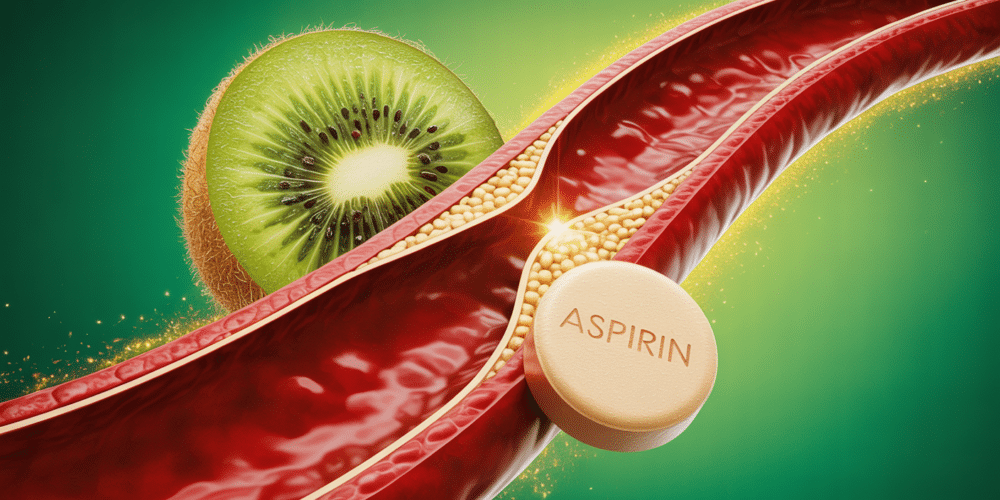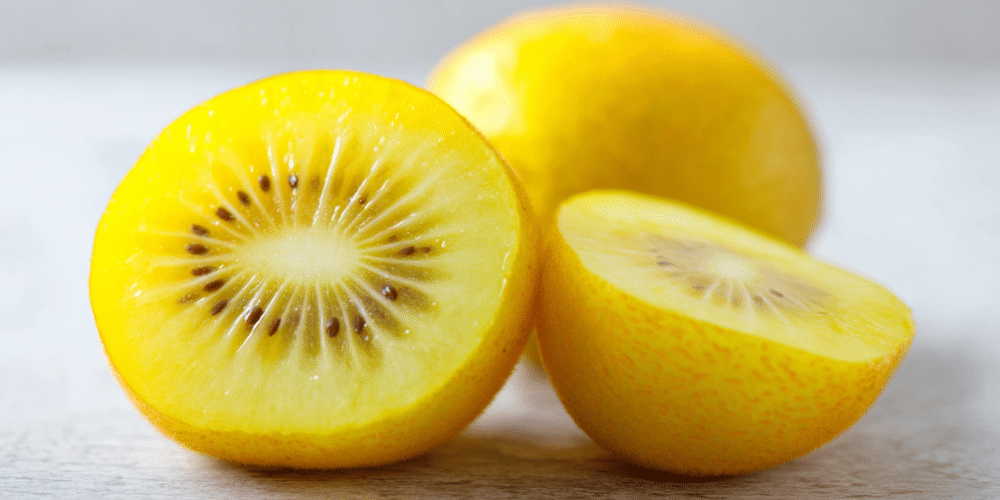
What if the secret to supporting clear arteries and healthy blood flow isn’t locked inside a pill bottle? What if it’s been hiding in your fruit bowl all along? This isn’t hype or guesswork. It’s a fact backed by compelling studies from respected journals that show how one specific, fuzzy little fruit can help thin your blood, lower your triglycerides, reduce dangerous inflammation, and even mimic some of the cardiovascular benefits of aspirin—all without the harsh side effects.
Millions of people take a daily low-dose aspirin to reduce their risk of blood clots and protect their heart. But this common practice isn’t without its risks. Long-term aspirin use can increase your chances of developing ulcers, gastrointestinal bleeding, and even kidney damage. This is precisely why discovering natural, food-based alternatives is such a game-changer for your long-term health. In this article, we’re going to break down the science and physiology behind a small but mighty fruit that can naturally support your arteries and overall cardiovascular system. The fruit I’m talking about is the kiwi. It may be small, but it is absolutely loaded with bioactive compounds that have powerful, positive effects on your heart and blood vessels. This isn’t just about vitamins; it’s about how this incredible fruit influences the very nature of your blood.
Key Takeaways
- Natural Blood Thinner: Kiwi has been shown to reduce platelet aggregation, which is the process that makes blood cells clump together and form clots. This makes your blood less “sticky” in a way that is similar to aspirin.
- Lowers Bad Fats: Regularly eating kiwi can significantly lower your plasma triglycerides, a type of fat in your blood that can increase your risk for heart disease.
- Reduces Inflammation: Kiwi contains powerful antioxidants and unique enzymes that help fight systemic inflammation, a key driver of plaque formation in the arteries.
- Improves Blood Flow: By boosting nitric oxide production, kiwi helps your blood vessels relax and dilate, which can lower blood pressure and improve overall circulation.
- Safer Profile: Unlike long-term aspirin use, kiwi does not irritate the stomach lining or carry the same risk of internal bleeding. It’s also low in Vitamin K, making it a safer option for many people on blood-thinning medications.
1. It Makes Your Blood Less “Sticky”

One of the biggest risks in cardiovascular disease is the formation of blood clots. When your blood is too “sticky,” your platelets—tiny blood cells that help your body form clots to stop bleeding—can become overactive. They start clumping together inside your arteries, a process called platelet aggregation. When this clotting becomes excessive, it dramatically increases your risk of a stroke, heart attack, or deep vein thrombosis. You want your blood to flow smoothly, not sludge through your vessels.
This is where kiwi truly shines. A fascinating 2004 study published in the journal Platelets looked at this exact effect. Researchers found that volunteers who ate just two to three kiwis per day for 28 days saw their platelet aggregation response reduced by a staggering 18%. In simple terms, the kiwi made their blood significantly less sticky and less likely to form dangerous clots. This outcome is remarkably similar to the effect of a low-dose aspirin, but it achieves it naturally, without chemically altering your body’s core functions or irritating your stomach lining.
2. It Fights Bad Fats in Your Blood

The same 2004 study that highlighted kiwi’s effect on blood stickiness also revealed another incredible benefit: participants’ plasma triglycerides dropped by 15%. Triglycerides are a type of fat (lipid) found in your blood. When you eat, your body converts any calories it doesn’t need to use right away into triglycerides, which are stored in your fat cells. High levels of triglycerides in your blood can contribute to the hardening of your arteries (atherosclerosis), which increases your risk of heart disease and stroke.
But kiwi’s fat-fighting power doesn’t stop there. It also helps combat the oxidation of LDL cholesterol. You’ve probably heard of LDL as the “bad” cholesterol. The real danger begins when this LDL becomes damaged by free radicals, a process called oxidation. This oxidized LDL is the spark that ignites plaque formation. It causes white blood cells and other substances to stick to the inner walls of your arteries, and over time, this buildup hardens into dangerous plaque. Kiwi is rich in powerful antioxidants, especially Vitamin C and Vitamin E. Vitamin E is particularly effective at preventing LDL from oxidizing in the first place, helping to stop that dangerous chain reaction before it even starts.
3. It Helps Your Arteries Relax and Widen

High blood pressure is often called the “silent killer” because it can damage your arteries for years without any obvious symptoms. One of the keys to healthy blood pressure is the flexibility and tone of your blood vessels. You want them to be able to relax and widen to accommodate blood flow, a process known as vasodilation. This process is heavily dependent on a molecule called nitric oxide.
Kiwi is an excellent source of Vitamin C, which does more than just boost your immune system. It plays a crucial role in enhancing your body’s production of nitric oxide. When you have sufficient nitric oxide, the smooth muscle cells in your endothelium—the thin inner lining of your arteries—can relax. This allows your blood vessels to dilate, which improves circulation throughout your entire body and naturally helps to lower your blood pressure. By supporting this fundamental process, kiwi helps protect the delicate lining of your arteries from the constant stress of high pressure.
4. It Calms Down System-Wide Inflammation

Chronic, low-grade inflammation is now understood to be one of the primary drivers of almost every major chronic disease, including heart disease. When your arteries are inflamed, they become a breeding ground for plaque. Your body’s inflammatory response can cause cholesterol and other substances to become trapped in the artery wall. One of the key markers doctors look for to measure this inflammation is C-reactive protein (CRP). Studies have shown that kiwi consumption can help reduce levels of CRP, indicating a powerful anti-inflammatory effect.
Beyond its vitamins, kiwi contains unique polyphenols and a special enzyme called actinidin. While actinidin is best known for aiding digestion by breaking down proteins in your gut, some research suggests it may also help break down pro-inflammatory proteins in your bloodstream that contribute to vascular damage. By tackling inflammation from multiple angles, kiwi helps to cool down the fire inside your arteries that leads to plaque buildup.
5. A Safer Profile Than Daily Aspirin

So, is kiwi a direct replacement for aspirin? No, and you should never stop taking any prescribed medication without consulting your doctor. However, it’s important to understand how they differ. Aspirin works by permanently blocking an enzyme called COX-1. While this effectively reduces the formation of chemicals that cause platelets to clump, it also thins the blood so much that it can damage the gastrointestinal lining and lead to dangerous bleeding over time.
Kiwi, on the other hand, reduces platelet stickiness and inflammation through a natural, nourishing cascade. It doesn’t create a chemical override; it supports your body’s own systems. This means you can get many of the same circulatory benefits with far less risk. Furthermore, many green fruits and vegetables are high in Vitamin K, which can interfere with blood-thinning medications like warfarin. Kiwi is naturally low in Vitamin K, making it a much safer dietary option for people who are on these types of medications or have clotting disorders.
How to Get Started

So, what can you do to start reaping these benefits? You can start simple. Try adding two kiwis to your daily routine. They are delicious, easy to find, and simple to prepare—just cut and scoop. You can have them in the morning to start your day, or with your largest meal. They are easy to digest and will immediately go to work supporting your circulation, your arterial flexibility, and your blood fluidity.
Conclusion
Remember, heart disease is often silent until it’s not. You could have 40%, 50%, or even 60% plaque buildup in your arteries and feel completely fine, until one day a plaque ruptures or a clot forms. That’s why prevention is so incredibly critical. The best time to protect your arteries is now, before symptoms ever have a chance to show up. This isn’t just about one fruit; it’s about shifting the way we see health and prevention. Your body is designed to heal and thrive. You just have to give it the right tools. Adding kiwi to your diet is one of the simplest, most effective tools you can put in your toolbox for a healthier heart.
Source: Dr. Mandell

